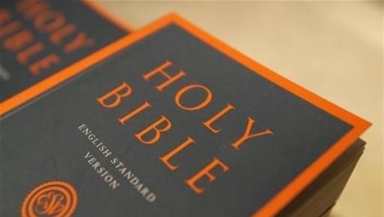
American pastor Kevin DeYoung has just published a book called What does the Bible really teach about homosexuality? It's billed as a pastoral, compassionate and humble book, which looks at some of the key passages on homosexuality, and then argues (with grace, compassion and so on) that "homosexual behaviour is wrong".
De Young might argue he's said nothing controversial. He is simply stating what has been considered the church's view on the subject for the past 2,000 years.
However, he is now writing into a context in which a significant number of Christians disagree with that point of view (this article gives a good example of how divided opinion is in the US). There are many who believe their very different reading of those passages is equally biblical. Matthew Vines' book God and the Gay Christian for example states that "Christians who affirm the full authority of Scripture can also affirm committed, monogamous same-sex relationships." There are many more who don't actually know what they think. They may know what the Bible says, but they're unclear what it means.
So what do we do? I genuinely believe that a good place to start is to look at what both 'sides' actually believe, rather than caricaturing their position (eg all conservatives are homophobic bigots, all liberals have thrown the Bible out of the window and been swept along with culture).
Those that have decided might think that giving both views equal weight is dangerous, as it suggests that both are equally valid (when clearly one is truth and the other is heresy). But I think there is nothing to be feared in investigating the arguments presented from the 'other side'. Doing so prevents us from becoming blinkered, and serves to sharpen our position and use of terminology.
And since this is perhaps the definitive pastoral and missional issue of our time, simply not knowing probably isn't good enough. Below I've listed a basic version of how each 'side' of the debate classically views those famous passages which directly reference same-sex behaviours, presented without any intent of bias. It's also worth noting that there are many other passages which can be used to support both lines of argument; but these are the most popular and – as Kevin DeYoung has proved – the biblical territory on which this conversation is most often held.
Note: in the list below I have decided to use the imperfect labels 'traditional' (to describe a pro-celibacy position) and 'progressive' (meaning pro-same-sex relationships). I acknowledge that some may find these imprecise, and therefore unhelpful. However, they are terms which we all understand in the context of this debate, and are probably the best way of presenting an unbiased explanation of the two general perspectives. I also understand that there are various versions of both positions, and that this is at best an approximation of how each group responds to Scripture in each instance.
Genesis 1-2
The key phrase: 'The man said, "This is now bone of my bones and flesh of my flesh"...For this reason a man will leave his father and mother and be united to his wife and they will become one flesh.' (NIV)
A traditional view: The creation story clearly sets up the family unit as one man, one woman. They're to be companions for one another, and they're told to 'be fruitful and multiply' (1:28), in order that the human race might flourish and the world become populated. God's intention is that Adam and Eve should have a family, who should in turn pair up with members of the opposite sex, and have a family of their own, and so on. There's no hint of a space in this worldview for same-sex relationships. If gay and lesbian people can't change their orientation, they should therefore remain celibate.
A progressive view: The creation story is poetry (based on ancient Babylonian ideas), rather than a literal account – otherwise the next generation after Adam and Eve's would have been an incestuous one. Therefore, not everything written in it should be interpreted as literal fact and commandment. In addition, while this might be God's plan for many of us, there are a number of people in the world for whom 'being fruitful and multiplying' is not an option, including those who are unable to have children, and those who are called to singleness and/or celibacy; raising the question of how these verses should be interpreted by those who experience same-sex attraction.
Genesis 19:1-11
The key phrase: 'They called out to Lot, "where are the men who came to you tonight? Bring them out to us so that we can have sex with them."' (NIV)
A progressive view: The culture of Sodom was depraved, but not because of homosexual activity. Their desire was to dominate these visitors sexually – as was common after victory in battle; putting the vanquished foe in the place of a woman. When the Bible talks variously elsewhere about Sodom's sin, it describes it not as homosexuality, but injustice (Isaiah 1:10-17; Ezekiel 16:48-49). Simply put, this wasn't about homosexuality but brutality.
A traditional view: The fallen city of Sodom was so depraved, that when strangers came to town, the men of the city immediately called for them to be brought out so that they could have sex with them. This demand for homosexual sex was another sign of how deplorable the culture of Sodom had become, and history now remembers this through language – sodomy became a word to describe homosexual sex; a hallmark of a fallen culture.
Leviticus 18:22 & 20:13
The key phrase: 'If a man has sexual relations with a man as one does with a woman, both of them have done what is detestable. They are to be put to death' (20:13, NIV)
A traditional view: Sexual activity between two men is strictly prohibited in the 'purity code' handed out to the Israelites. While Christ's sacrifice removes the 'death penalty' mentioned in 20:13, the rule is still consistent with biblical teachings in the New Testament.
A progressive view: Leviticus is full of rules involving subjects as diverse as mildew, tattoos, and where to go to the toilet, none of which are followed by non-Jews (or indeed by many Jewish people) today. (However, conservative theologian James M Hamilton Jr writes, in his essay 'How to condone what the Bible condemns: Matthew Vines on the Old Testament', that "Read in context, the commands against same-sex relations in Leviticus 18 and 20 mesh perfectly with the moral order of creation presented in Genesis 1-2, correctly interpreted by Jesus in Matthew 19:4-5"). A progressive view might also argue that in a culture where women were treated as property, the 'abomination' here was the act of a man being 'reduced' to the state of a woman by having sex with another man.
Deuteronomy 23:17
The key phrase: 'There shall be no whore of the daughters of Israel, nor a sodomite of the sons of Israel. (KJV)'
A progressive view: The NIV translates very differently to the KJV – the verse becomes 'No Israelite man or woman is to become a shrine prostitute'. There's obviously a world of difference between these two interpretations of the Hebrew word 'quadesh.' A liberal view is therefore that this verse has no bearing on the discussion around same-sex attraction.
A traditional view: The King James Version of this verse implicates all gay men, whether they're engaged in casual sex, or in a committed monogamous relationship. Since Israel is a term for God's people – a family into which all have now been included – this applies beyond simply the Israelites themselves.
Romans 1:26-27
The key phrase: 'Men committed shameful acts with other men, and received in themselves the due penalty for their error' (v27b, NIV)
A traditional view: In Romans 1:18-32, Paul talks about God's wrath against the sinfulness of humanity, which, without the atoning sacrifice of Jesus, would send all of us to an eternal death. He lists many of those sins which would otherwise separate us from God, and includes – loudly and clearly – descriptions of both gay and lesbian sex. In an article for The Gospel Coalition, Kevin DeYoung writes of this passage that, "for Paul, the biological complementarity of the male-female union is the obvious order of things. A male-male or female-female sexual pairing violates the anatomical and procreative design inherent in the one flesh union of a man and a woman."
A progressive view: In all his letters, Paul is writing to a specific group of people, at a specific time (traditionalists would counter here that the principles he lays out are meant to outlive that cultural context). Here, progressives say, Paul is writing in the context of a hedonistic culture where orgies were common. Heterosexual people 'abandoned' their natural, God-given sexual orientation and acted as if they were homosexual; one interpretation of the original Greek is that the problem is that they were not homosexuals, but heterosexuals acting in violation of their created order. By the same logic, it would be sinful for a homosexual person to engage in heterosexual sex. It's also important to note here that these orgies took away the structure of committed, long-term relationships, and abused God's intention for sex.
1 Corinthians 6:9-10
The key phrase: 'nor adulterers, nor men who have sex with men... shall inherit the Kingdom of God (NIV).'
A progressive view: The two Greek words which are translated here 'as men who have sex with men' are makakoi (translated in the KJV as 'effeminates' and arsenokoitai, but there are a wide variety of interpretations among scholars of both words. The latter is used in different ancient manuscripts to refer to temple prostitutes and even child abusers. The exact meaning has arguably been lost to history – meaning it's unethical to interpret this as a condemnation of homosexual relationships. 1 Timothy 1:9-10 involves the same issue of translation with the word arsenokoitai.
A traditional view: Paul includes, in another list of unrighteous people like the one found in Romans 1, 'men who have sex with men'. He also includes drunkards and the greedy in this list, although they seem to get off more lightly in Christian culture. Nevertheless, Paul defines all these people as 'wrongdoers' whose sin – were it not for the sanctification of Jesus (v11) – would prohibit their entry into the Kingdom of God.
Whatever conclusions you might personally draw on these passages, surely the important point is that all of us takes the time to read and pray through Scripture for ourselves, rather than simply relying on the scholarship or compellingly-worded opinions of others. The chasm of opinion between the two sides of the debate means consensus on the question is unlikely, but in the meantime, 'I don't know' is becoming an increasingly hollow response to those outside the church, and to the LGBT community.













